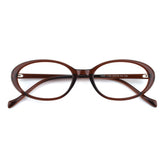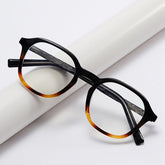What is a pd for eyeglasses?
When you get a prescription for eyeglasses, you might notice a term called PD, or Pupillary Distance. Understanding PD is crucial for ensuring your glasses fit well and provide optimal vision correction.
This blog will explain:
- What is PD?
- What’s the average PD for adults?
- Why is PD Important?
- How to Measure PD?
- Types of PD Measurements.
- When to Use PD?
1 What is PD?
PD stands for Pupillary Distance, which is the distance between the centers of your pupils in millimeters. This measurement is vital for the proper alignment of your lenses with your eyes, ensuring that you look through the optical center of each lens.
2 What’s the average PD for adults?
The average adult pupillary distance (PD) value range is typically between 54 and 74 millimeters. The average pupillary distance (PD) for women is approximately 60 mm, while for men, it is around 64 mm. Nevertheless, it's important to note that pupillary distance can vary among individuals.
3 Why is PD Important?
-
Accurate Vision Correction:
- Ensures the lenses are positioned correctly in front of your eyes.
- Prevents issues like blurry vision, eye strain, and headaches that can occur if the lenses are misaligned.
-
Comfort:
- Properly aligned lenses provide more comfortable and natural vision.
- Reduces the need for your eyes to adjust to incorrect lens positioning.
-
Effectiveness of Multifocal Lenses:
- For bifocals, trifocals, or progressive lenses, accurate PD is even more critical.
- Ensures the different sections of the lenses (for distance, intermediate, and near vision) align correctly with your line of sight.
4 How to Measure PD?
-
Professional Measurement:
- Optometrist or Optician: The most accurate method is having your PD measured by a professional during your eye exam.
- Digital Devices: Some optical stores use digital PD meters for precise measurements.
-
- Materials Needed: A ruler (preferably a millimeter ruler) and a mirror or a helper.
-
Step-by-Step Guide:
- Stand in front of a mirror or have a helper face you.
- Look straight ahead and align the zero mark of the ruler with the center of one pupil.
- Measure the distance to the center of the other pupil. Make sure to measure in millimeters for accuracy.
- Repeat a few times to ensure consistency.
-
Online Tools:
- Some websites and apps can help you measure your PD using your smartphone or computer. These tools typically guide you through the process with visual aids and instructions.
5 Types of PD Measurements:

-
Single PD:
- A single measurement representing the total distance between your pupils.
- Used for single vision lenses.
- From the picture abrove, the single PD value should be 31.5+31=62.5.
-
Dual PD:
- Two measurements, one for each eye, representing the distance from the center of each pupil to the center of the bridge of the nose.
- Especially important for progressive and bifocal lenses.
- From the picture abrove, the OD PD value should be 31.5, and the OS PD value should be 31.
6 When to Use PD?
- Ordering Glasses Online: Most online eyewear retailers require your PD to create accurately fitting lenses.
- Replacing Lenses in Existing Frames: If you’re having new lenses made for your existing frames, providing your PD ensures the new lenses are correctly centered.
PD is a critical measurement for anyone wearing glasses, ensuring that your lenses provide the best possible vision correction and comfort. Whether you have it measured professionally or do it yourself, having an accurate PD will help you achieve the most effective and comfortable eyewear experience.
Always double-check your PD when ordering new glasses, especially if you are switching to a new style or type of lens. Accurate PD ensures you enjoy clear vision without the discomfort of poorly aligned lenses.











